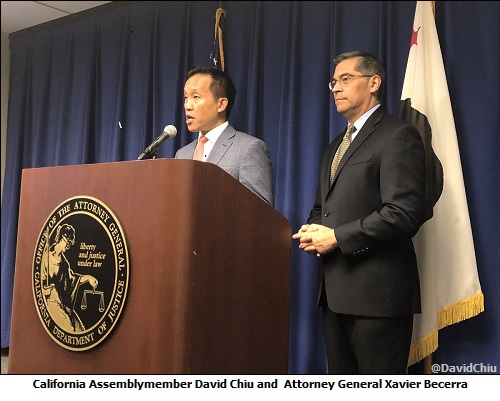
|
|

|
|
| April 25, 2024 |
|
California guides businesses on how to avoid “aiding and abetting” immigration authorities 
SACRAMENTO--The California Attorney General Tuesday issued details on how businesses can navigate a controversial new state law that limits employers’ cooperation with immigration authorities while still complying with federal law.
“Just to be clear, there is no conflict between what (the California law) requires and what federal law requires,” Attorney General Xavier Becerra said at a press event. The new Immigrant Worker Protection Act (AB 450) went into effect at the start of the year and has caused concern and confusion among some employers. It requires employers to keep workers informed when the federal government is investigating their status and not to cooperate unless the immigration authorities present a judicial warrant or official audit notice. Many California businesses were not aware of the new rules, while others struggled to put its requirements into practice. Tuesday’s release of more information from the Attorney General and the California Labor Commissioner’s Office, both of which are charged with enforcement of the law, was meant to bring clarity for businesses as workplace raids by ICE seem to grow more frequent in the state, and employers are increasingly on the front lines of California’s immigration war with the Trump Administration. The acting director of U.S. Immigration and Customs Enforcement, Thomas Homan, has said his agency plans increased enforcement in California because of its declared status as a sanctuary state. “There is nothing we can do to protect Donald Trump from sending ICE agents to California,” said California Assemblymember David Chiu, D-San Francisco, the author of the law, after the Attorney General’s announcement. “What we can do is put laws in place to ... make sure that our employers are not aiding and abetting the anti-immigrant enforcement arm of Donald Trump’s deportation machine and that is exactly what this law is about. We want to make sure that Donald Trump and his ICE agents are following the law and the constitution.” Chiu said that, “We’ve certainly known workplace raids in the past where … ICE agents are just barging into doors, flashing a badge and going into particularly the non public spaces in workplaces and that is exactly the kind of activity we don’t want.” In early February, U.S. Customs and Immigrations agents visited 77 worksites in its northern California territory, which extends from Bakersfield to the Oregon border, to deliver audit notifications. These give the government legal access to employee I-9 records meant to verify a person’s right to work in the United States. In January, the federal government also raided nearly 100 7-Eleven stores across the country, including some in California. Becerra said he was not aware of any instance in those actions where U.S. immigration officials didn’t follow the correct legal procedure, or where employers failed to follow the new California law. He said that his office was in contact with “a number of individuals and a number of employers” who were involved in earlier raids in California. In the Sacramento region, the Monsanto agricultural facility in Woodland received an audit notice on Feb. 1. In Fresno, The Bee reported that about eight agricultural employers in the San Joaquin Valley had received audit notices. At Bee Sweet Citrus in Fowler, south of Fresno, 40 workers out of about 500 did not return to work after the audit notice was received. “One woman who has worked for me for nearly 20 years came up to me, gave me a hug and told me that she had to leave; she couldn’t take a chance,” said Jim Marderosian, Bee Sweet president. “I got emotional because this is a very difficult thing for families.” ICE spokesperson Yasmeen Pitts-O’Keefe said there had been no further workplace raids in the area since those in early February, but the results of those audits were part of an ongoing investigation and not available. Chiu said he thinks the Trump administration is trying to drive immigrant workers out of their jobs. “Let’s make no mistake about what the recent ICE enforcement actions are about,” Chiu said. “They are a deeply cynical attempt to scare law-abiding Californian workers into quitting their jobs and to disrupt our thriving California economy.” Chiu said that one in three California workers is an immigrant, and one in ten is undocumented. In fiscal year 2017, HSI conducted 1,360 I-9 audits and made 139 criminal arrests and 172 administrative arrests. Businesses were ordered to pay $97.6 million in judicial forfeiture, fines and restitution and $7.8 million in civil fines, according to an ICE press release. Becerra said his office had reached out to businesses and trade groups across the state in sectors including agriculture, retail, construction and hospitality to inform them of the new state law and learn what provisions were hardest to understand prior to issuing the new guidelines. The California law requires employers keep employees informed of federal actions. Employers must post notices within 72 hours after receiving a federal audit notice requesting access to records, and inform individual employees if the federal government finds their records problematic. It also requires employers to verify that immigration officials seeking access to private areas of work places or employee records have a judicial warrant or an official audit notice. The law prohibits employers from cooperating based only on administrative warrants issued by government agency rather than courts. Those types of documents could include a “warrant of deportation or removal,” according to the Attorney General’s office. Becerra said many of the questions his office have received are questions about how to recognize those legal documents. (Source: The Sacramento Bee) Story Date: February 18, 2018
|